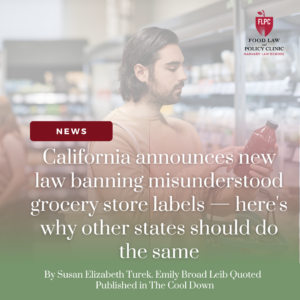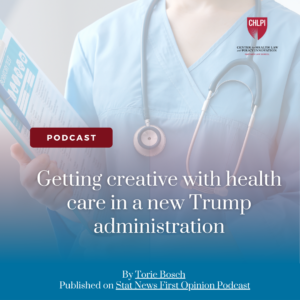By: Jeni Lamb, Emory University School of Law
It’s a bit of a dreary Saturday. The kind of day where it is so overcast that you look outside, know that it is day, but couldn’t say whether it is 10 AM or 3 PM in the afternoon. In my third year of law school at Emory, I would count this as the perfect day to barricade myself in the Emory Law library and catch up on my studying. Today, however, along with more than a hundred other students from 50 other law schools, I am roaming the halls of Harvard trying to find a classroom workshop on food safety.
We are here at the first ever Food Law Student Leadership Summit because each of us has a passion for food law, a topic that for most people inspires the question: what is that? And is closely followed by: Is that a thing? For me, food law is about helping small and medium-size growers achieve a sustainable livelihood by producing healthy food. A big part of this is food safety. In my work prior to law school with the nonprofit Appalachian Sustainable Development, we used voluntary farmer compliance with the United States Department of Agriculture (USDA) Good Agriculture Practices (GAP) program for produce safety audits to market conventional and organic produce to wholesale buyers like Ingles and Whole Foods in the Southeast. While people have come to the Summit from a number of different backgrounds, for the first time in my life I haven’t felt alone in wanting to do legal work in this area.
When we enter the classroom for the late morning session on food safety, we are greeted in the best way to that any food obsessed law student could ask for: a plate of homemade looking chocolate chip cookies, a bag of miniature pears, and a bottle of hand sanitizer. “Help yourself,” says Professor Baylen Linnekin, who will be leading the talk this morning. And we do—it’s just before lunch, and at this point, we are all ready for a snack.
So, we return to our seats with cookies and pears and we dive into the topic for our discussion: will a single food safety agency make food safer?
This past summer, the Obama Administration issued its proposal for a single agency for food safety. The idea has been circulating in congressional hearings for a decade—spurred on by major food safety outbreaks in bagged spinach and the Westland Hallmark scandal. The product of that national debate was an intermediate solution: the passage of the Food Safety Modernization Act (FSMA). The act significantly expands Food and Drug Administration (FDA) resources and jurisdiction over food safety, but maintains the current division of responsibility for food safety between several agencies.
Whether a solitary food safety agency would make food safer is a difficult question, and we split into groups to brainstorm our ideas. First, we ask what are the motivations for a solitary food safety agency? While FDA and USDA bear the primary responsibility for food safety, at least 15 agencies administer at least 30 laws that relate to food safety. Certainly, it seems that solitary agency may create greater efficiency over the long run. And such an agency could fully adopt a preventative, rather than a reactive approach to food safety. However, many are concerned that a single agency may create a one-stop shop for lobbying efforts, and even increase the revolving door between the private sector and government.
Next, what would it take to reorganize the regulation of food safety? Several of us raise the problems with creating a new agency from previously existing agencies. For example, when the border agricultural inspection services formerly administered by the USDA were absorbed under the Department of Homeland Security, the United States experienced a considerable spike in the introduction of invasive species. In the fight of bugs, drugs, and thugs for enforcement resources, bugs lost in a big way – but the cost was largely borne by farmers. In that interim period of reorganization for a solitary agency, could there be a similar risk of food being made less safe?
Finally, would a solitary food safety agency make sense at this point in time? FSMA was just passed, and the FDA is expending considerable resources to implement it. The key mechanism through which FSMA operates is requiring the FDA to issue a suite of rules to address produce food safety, require preventive controls through the human food supply chain, require preventive controls through the animal food supply chain, and create requirements for third-party auditing of imported foods. Many of us in the room have been a part of the public process while FDA has issued these rules, and filed comments with the agency. For some, it is their first introduction to food safety. Such diversity in experience creates a number of different perspectives.
The whole picture is complicated by the fact that FDA has not been perfect in its attempt to play a larger role in food safety—its inexperience as a regulator in this area was revealed in its efforts to regulate brewery spent grains, and even its initial attempts to avoid preparing an environmental impact statement for the Produce Rule. But what is to say that a new solitary food agency would not experience similar growing pains? Should we abandon the attempt to have the FDA play a larger role in food safety before that effort even gets underway?
There’s little doubt that the USDA would strongly oppose such a reorganization. The USDA already lost some ground in its role in food safety after FSMA, and the Secretary of Agriculture, as a cabinet level official, would likely vehemently oppose a further reduction in the agency’s jurisdiction over food safety.
Our hour is up. We take a vote, and the group is surprisingly evenly divided between those who would oppose a solitary agency, those who would support a solitary agency, and those who remain undecided. Clearly, there are issues here that, even while most of us have experience working in this area, will need much more time to fully think through.
But our most important lesson is yet to come.
Before we leave, Professor Linnekin asks how many people had used the hand sanitizer before grabbing a cookie. Myself and two others raise our hands. Yet, none of us asked where the cookies came from, whether the pears had been washed, or had gone out to wash them ourselves.
The reality is, an incredibly high percentage of food borne illness results from improper handling. We all know we should clean our hands before we eat, that we should wash our produce, but we often don’t. Yet, we are willing to push the responsibility for food safety back onto the farmer. While we are future lawyers, we are also consumers too. In the fight for a safer food system, we can’t forget that the burden is also on us as consumers as well as the growers of our food.




Health Law & Policy, Commentary
Addressing The HIPAA Blind Spot For Crisis Pregnancy Centers
November 18, 2024